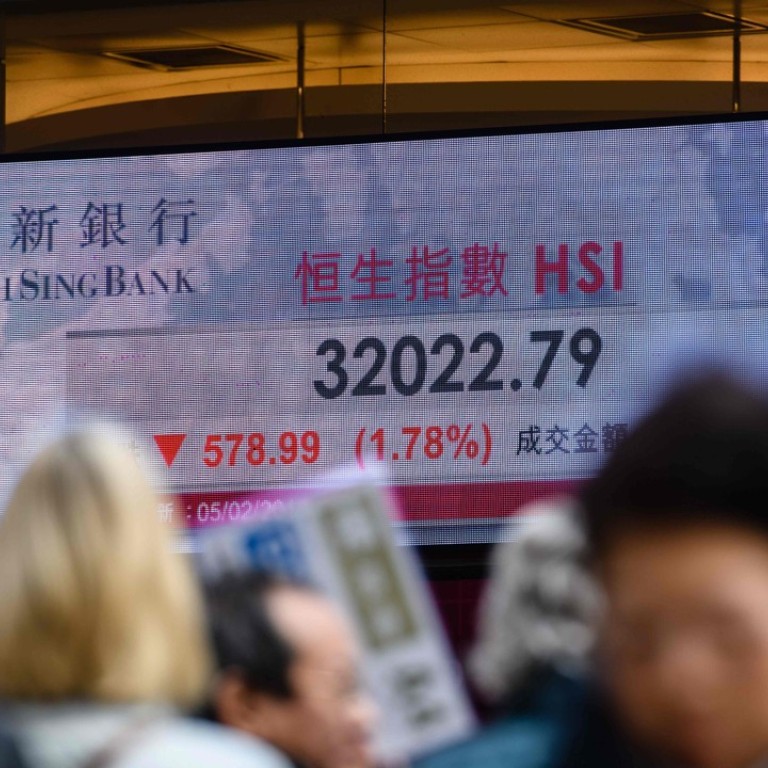
Update | Hong Kong stocks slammed for 300-point loss as Cohn’s departure sparks renewed trade war jitters
Hang Seng Index ends at 30,196.92, tumbling 1pc. Chinese banks mostly rise after regulators relax bad-loan provision rules
Hong Kong stocks fell for a third straight session on Wednesday, as concerns mounted about a global trade war after the sudden resignation of top White House economic adviser opposing President Donald Trump’s imposition of tariffs on imported metals.
The Hang Seng Index slid 1 per cent, or 313.81 points, to 30,196.92. The Hang Seng China Enterprises Index, known as the H-shares gauge, lost 1.1 per cent. The mainland’s benchmark Shanghai Composite Index fell for the first time this week.
Major markets in the Asia-Pacific region also treated on Wednesday after Gary Cohn, seen as being in favour of free trade, said he intends to leave his post as director of the National Economic Council. His sudden decision comes after Trump announced tariffs on steel and aluminium imports, which has renewed market jitters about a possible all-out global trade war.
“Should a trade war break out, every major economy will set up much higher barriers for foreign trade and that will not be good for these countries, nor global growth,” said Wang Chen, a partner at Xufunds Investment Management in Shanghai. “The stock markets are on a risk-off mode now.”
Chinese airlines fell after oil prices settled higher for a third straight session on Tuesday in New York, sparking concerns over higher fuel costs. Air China dropped 5.9 per cent to HK$10.84, China Southern Airlines lost 3.9 per cent to HK$9.55 and China Eastern Airlines eased 3 per cent to HK$6.26.
Tencent Holdings, the biggest weighting on the Hang Seng Index, retreated 1 per cent to HK$434.20. AAC Technologies Holdings slid 2.6 per cent to HK$149.
On the mainland, the Shanghai Composite Index fell 0.6 per cent, or 17.97 points, to 3,271.67. The large-cap CSI 300 Index lost 0.7 per cent and the ChiNex measure of small-caps also dropped 0.7 per cent.
Property developers fell after a top official from the Ministry of Finance said the government is drafting a property tax law. China Vanke declined 2.3 per cent to 32.90 yuan. Gree Real Estate lost 3.1 per cent to 5.65 yuan, Rongan Property shed 4.6 per cent to 4.54 yuan and China Fortune Land Development was off 1.9 per cent at 37.64 yuan.
Chinese lenders bucked the weaker market trend after the China Banking Regulatory Commission said it will ease the requirement for their loan-loss provision, the money banks must put aside as reserves for potential losses from bad loans and customer defaults.
Measures include a cut to the provision coverage ratio to a range between 120 and 150 per cent from a fixed 150 per cent, and a reduction of the loan provision ratio to a range of 1.5 to 2.5 per cent from a fixed 2.5 per cent.
UBS Group said in a report on Wednesday that the move could boost banks’ profitability and leave them with more capital to lend.
If fully implemented within a year, the measures could increase Chinese banks’ 2018 pre-tax profit by 6 to 60 per cent, the analysts said.
China Merchants Bank advanced 2.2 per cent to 30.76 yuan and Bank of Ningbo added 3 per cent to 20.48 yuan. China Construction Bank rose 2 per cent to 8.26 yuan.


